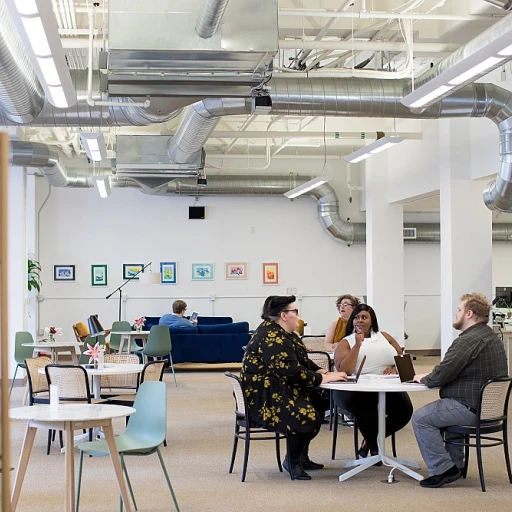
Understanding the impact of morale on workplace performance
The Link Between Morale and Performance
Morale in the workplace is more than just a buzzword. When employees feel valued and supported, their motivation and productivity naturally increase. A positive work environment helps team members feel connected, leading to better collaboration and a stronger sense of community. High employee morale is closely tied to lower turnover rates, fewer absences, and improved overall company performance.
Why Employee Morale Matters
Every day, employees bring their unique skills and energy to the office. When morale is high, people feel empowered to share ideas, take initiative, and celebrate hard work. This creates a ripple effect, boosting not only individual performance but also the collective spirit of the team. Companies that invest in morale-boosting strategies often see a more engaged workforce and a healthier company culture.
- Teams with high morale are more likely to participate in team building activities and fun office events like trivia games or scavenger hunts.
- Morale boosters help foster a sense of belonging, making employees feel like valued members of the company.
- Small gestures, such as recognizing achievements or creating opportunities for employees to share feedback, can fill the day with positivity and boost employee engagement.
Morale as a Foundation for Engagement
Employee engagement is built on the foundation of morale. When team members feel connected and supported, they are more likely to contribute to a thriving work environment. This is especially important as companies explore new ways to enhance engagement, including the use of artificial intelligence. By understanding the impact of morale, organizations can create targeted strategies that not only boost morale but also strengthen the overall company culture.
For a deeper look at how morale shapes a positive work culture, check out this resource on the impact of AI on fostering a positive work culture.
How artificial intelligence is changing employee engagement
AI Tools Shaping Employee Engagement
Artificial intelligence is rapidly transforming how companies approach employee engagement and morale. By integrating smart technologies into daily HR operations, organizations can better understand what makes their teams thrive and how to create a positive work environment. AI-driven platforms analyze feedback, monitor sentiment, and recommend personalized morale boosters, helping leaders respond to employee needs in real time.
Personalized Experiences for Every Team Member
AI-powered solutions allow HR teams to tailor experiences that make employees feel valued. For example, sentiment analysis tools scan surveys and communications to detect shifts in morale, enabling quick action. Automated recognition systems can highlight hard work and achievements, ensuring team members feel appreciated. These tools help foster a sense of community, making people feel connected even in remote or hybrid offices.
- AI chatbots answer HR questions instantly, reducing frustration and improving the work day.
- Smart scheduling tools fill gaps in team building activities, making it easier to organize fun events like trivia games or scavenger hunts.
- Data-driven insights help managers check on employee morale and adjust strategies to boost engagement.
Building a Stronger Company Culture
With AI, companies can create a more inclusive and supportive company culture. By analyzing patterns in employee engagement, AI helps identify what motivates teams and which morale boosters are most effective. This approach not only improves the overall work environment but also supports long-term retention and satisfaction. For more on how seamless technology can enhance the employee experience, explore enhancing employee experience through seamless login systems.
Fun ways to boost morale at work using AI-driven solutions
Injecting Playfulness into the Workday with AI
Bringing fun into the office isn’t just about ping-pong tables or casual Fridays. Today, artificial intelligence is helping companies create engaging experiences that make employees feel valued and connected. When teams feel a sense of community, morale naturally gets a boost. Here are some creative, AI-driven ways to fill the workday with energy and positivity:
- AI-Powered Trivia Games: Platforms now use AI to generate custom trivia games tailored to your company culture, recent achievements, or even inside jokes. These games can be played during breaks or as part of virtual team building activities, helping team members bond and share a laugh.
- Personalized Recognition: AI tools can analyze employee engagement data and suggest timely ways to recognize hard work. Whether it’s a digital badge, a shout-out in a team chat, or a small reward, these gestures make people feel seen and appreciated.
- Virtual Scavenger Hunts: AI can create unique scavenger hunts that encourage employees to explore different parts of the company’s digital workspace. These activities foster a sense of adventure and teamwork, even for remote teams.
- Wellness Check-Ins: Some AI solutions offer daily check-ins, asking employees how they feel and suggesting morale boosters based on their responses. This helps HR spot trends and intervene early if morale dips.
By integrating these AI-driven solutions, companies can boost employee morale and create a more vibrant work environment. The key is to use technology not as a replacement for human connection, but as a tool for building activities that foster a sense of community. For more affordable ways to boost employee engagement, check out this guide to boosting employee engagement.
Remember, the best morale booster is one that makes employees feel connected and valued. AI can help, but it’s the thoughtful application that truly transforms company culture.
Balancing technology and the human touch in HR
Finding the Right Balance Between AI and Human Interaction
While artificial intelligence can help boost employee morale and streamline team building activities, it’s important to remember that technology should complement—not replace—the human touch in HR. Employees often feel most valued when there’s a genuine connection with their team members and leaders. Relying solely on AI-driven solutions can risk making people feel disconnected, even if the intent is to foster a sense of community.
Creating a Supportive Work Environment
AI tools can fill gaps in employee engagement by automating feedback, scheduling fun office events, or organizing virtual scavenger hunts. However, these tools work best when paired with authentic human interactions. For example, after an AI-powered trivia game, managers can personally recognize hard work or share appreciation for team achievements. This combination helps employees feel seen and valued, strengthening company culture and boosting morale.
- Use AI to suggest morale boosters like team challenges or scavenger hunts, but let team leaders facilitate discussions and share feedback.
- Encourage employees to check in with each other, not just through automated reminders, but with real conversations that foster a sense of community.
- Balance digital recognition with in-person or video acknowledgments to make employees feel truly appreciated.
Respecting Privacy and Building Trust
When implementing AI in the office, companies must be transparent about how employee data is used. Sharing a clear privacy policy helps build trust and ensures team members feel safe participating in morale-boosting activities. Employees are more likely to engage in team building when they know their information is handled responsibly.
Encouraging Team Members to Share Ideas
AI can help gather feedback on what makes employees feel connected and motivated at work. Still, it’s essential to create opportunities for team members to share their own ideas for morale boosters. This approach not only boosts employee engagement but also helps create a work environment where everyone feels their voice matters.
Overcoming challenges in implementing AI for morale-boosting
Common Obstacles When Integrating AI for Morale
Introducing artificial intelligence into the workplace to boost employee morale can be exciting, but it’s not without its hurdles. Many companies, whether large or small, face similar challenges when trying to blend technology with their existing HR practices. Here are some of the most common obstacles:
- Employee skepticism: Some team members may worry that AI tools will replace the human touch or make the office feel less personal. This can impact how employees feel about new morale-boosting initiatives.
- Data privacy concerns: Employees want to know their information is safe. When using AI to track engagement or organize team building activities like trivia games or scavenger hunts, it’s essential to have a clear privacy policy in place.
- Technical barriers: Not every team has the resources or expertise to implement advanced AI solutions. Smaller companies may struggle to fill knowledge gaps or find the right tools that fit their work environment.
- Maintaining a sense of community: Relying too much on technology can make people feel disconnected. It’s important to foster a sense of belonging and ensure that AI-driven solutions still encourage employees to share, connect, and celebrate hard work together.
Strategies for Successful Implementation
To overcome these challenges and truly boost employee morale, HR teams can focus on a few key strategies:
- Transparent communication: Clearly explain how AI tools will be used to support employees and enhance company culture. Let team members know how their feedback will shape future morale booster initiatives.
- Blending tech with tradition: Combine AI-driven activities with classic team building events. For example, use AI to organize a scavenger hunt, but encourage in-person collaboration to help employees feel connected.
- Continuous feedback: Regularly check in with employees to see how they feel about new tools and activities. This helps HR teams adjust their approach and ensure everyone feels valued.
- Inclusive design: Make sure AI solutions are accessible to all team members, regardless of their tech skills. This creates a more supportive and engaging work environment for everyone.
By addressing these challenges thoughtfully, companies can create a workplace where employees feel supported, engaged, and motivated every day. The right balance of technology and human connection is key to building a strong sense of community and boosting employee morale.
Measuring the success of morale-boosting strategies with AI
Tracking Progress with Data-Driven Insights
Measuring the success of morale-boosting strategies is essential for any company aiming to create a positive work environment. Artificial intelligence offers new ways to check how employees feel about their day, team, and overall company culture. With AI, HR teams can gather real-time feedback, analyze trends, and identify which activities truly boost employee morale.
Key Metrics to Monitor
- Employee engagement scores: AI tools can fill surveys and analyze responses to see how engaged team members are over time.
- Participation rates: Tracking involvement in team building activities, trivia games, or scavenger hunts helps reveal which morale boosters are most effective.
- Sentiment analysis: AI can scan internal communications to detect shifts in how employees feel, highlighting areas where people feel more connected or need extra support.
- Turnover and retention: A boost in employee morale often leads to lower turnover. Monitoring these numbers gives a clear picture of long-term impact.
Balancing Privacy and Transparency
While AI provides valuable insights, it’s important to respect employee privacy. Make sure your privacy policy is clear and that team members know how their data is used. Transparency builds trust and helps foster a sense of community within the office.
Sharing Results and Celebrating Wins
Sharing progress with employees keeps everyone motivated. When teams see that their hard work and participation in fun activities are making a difference, it boosts morale even further. Regular updates, whether through a white board in the office or digital dashboards, help everyone feel connected and valued. This approach encourages ongoing engagement and helps build a strong company culture.













